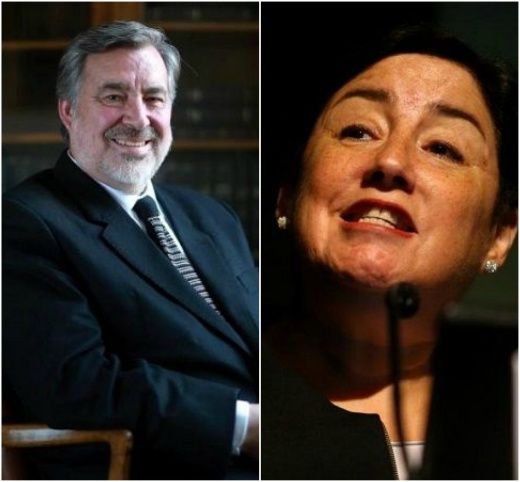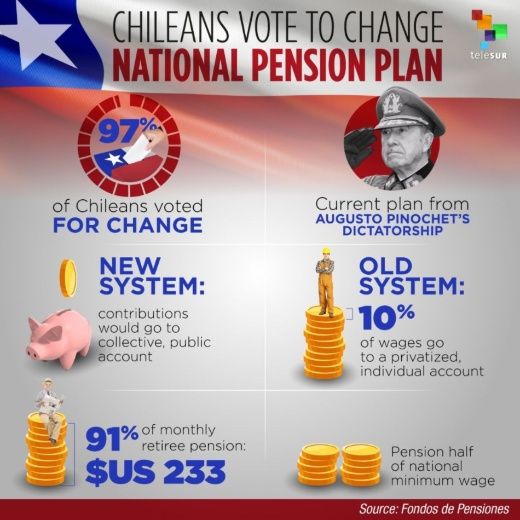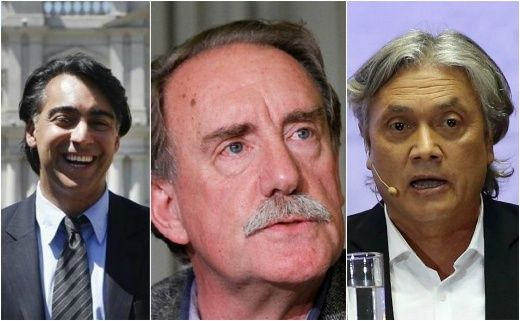It was the first country in Latin America to elect a Marxist president — and for that Chile paid dearly.
When Salvador Allende was overthrown in a CIA-backed coup-d'etat in 1973, military General Augusto Pinochet took reign, ruling the country in a brutal, merciless dictatorship for the next 17 years.
RELATED:
Center-Left Candidate Narrows Gap with Piñera for Presidential Bid
Since Chile’s transition to democracy in 1990, the country’s political pendulum has shifted rightward only once. But with an increasingly divided left, many are pegging the same will happen during this year’s elections on Sunday, November 19.
With billionaire and former right-wing president Sebastian Pinera leading polls, the left in Chile has five candidates out of eight to cast their bid on. All five have positioned themselves against Pinochet’s dark legacy — but is Chile’s faith likened to the rest of Latin America, that in the last few years, has pivoted yet again to the right?
Old left vs. new left
The biggest political question for Chile’s left is whether a constituent assembly will take place to finally reverse the country’s Pinochet-era constitution, that has since inhibited much progressive change in the country.

Those tasked to take this on includes the two major candidates that the left is split between: independent Alejandro Guillier, who has the support of the governing New Majority coalition; and the newly-formed Broad Front coalition’s Beatriz Sanchez, who has been critical of the New Majority’s leadership.
Guillier is leading well past Sanchez, not least of all due to the support of the coalition that has won nearly every election since the military junta-ruled days. His popular T.V. show “Zero Tolerance”, as well as his time as a senator and as a journalist, also cement the likely possibility he'll be second in running to Pinera.
The New Majority coalition comprises of a number of center-left and left groups, ranging from the Social Democrat Radical Party, to the Communist Party — which at nearly 67,000 members boasts the most members of any political group in the country.
Guillier has campaigned under the slogan of “president of the people”, promising employment for all, gender equality, prioritizing public health, and the “construction of a more fair and inclusive country.” The center-left candidate plans on furthering current president Michelle Bachelet’s social democrat agenda, including fully implementing the new tax system created by her administration.
Sanchez, on the other hand, has emerged from a movement that was officially formed in just January of this year. However, the Broad Front coalition has been several years in the making, emerging from a series of protest movements headed by students and pensioners.

The popular radio host has risen in popularity over the course of October, appealing to those who agree that the New Majority has been slow to implement promised reforms.
The coalition, comprised of a diverse grouping of progressive, new-left, liberal parties and protest movements, has criticized what they see as the widening of inequality in the country, especially in the area of education, due to privatization measures.
Broad Front has therefore promised to renationalize social services such as education, health, pensions and water provision, in a bid to end the unequal distribution of wealth. Their plans include free and universal education, abolishing privatized student debt and ending the private pension system, with all these policies funded by taxing the rich.
Despite their differences, both Guiller and Sanchez have stated they will support any leftist candidate that will make it into the runoff with Pinera.
The left: more divided than the right
Three more candidates are running on a left platform in the upcoming elections, however, with decidedly less support and popularity, giving a nod to evidence of how divided the left is.

Marco Enriquez-Ominami, the Progressive Party’s candidate, grew up exiled to France by the Pinochet dictatorship. His father had also been assassinated while leading an underground resistance movement against the military regime.
Critical of all major political coalitions in Chile, Enriquez-Ominami has run for president twice before. He has pledged to raise the minimum wage, tax the “super-rich”, decrease military spending and increase funding for anti-poverty programs.
Another candidate is Eduardo Artes, the leader of the Chilean Communist Party (Proletarian Action), a smaller Marxist-Leninist party that originated as a split from the now-defunct Maoist party, the Revolutionary Communist Party of Chile.
Artes, a teacher, is running on a communist, “anti-revisionist” platform with the Patriotic Union party. His proposal is "a refoundation of Chile, (that will come) from the workers and with the people", reversing privatization in all sectors of the country.
Finally, Alejandro Navarro, the senator in Chile’s Bio-Bio province, who founded the Pais party last year, puts forward a progressive, socialist agenda. He has pledged opposition to the deeply unpopular, privatized pension system, and is also pushing for free, universal education.
Navarro has also spoken out in support of Venezuela, comparing the economic war against the Bolivarian revolution to the coup carried out against Allende decades ago.
The reversing winds of the Pink Tide
While Pinera’s lead threatens to shift Chile to the right, the billionaire is likely to benefit most from a low voter turnout.
With only 43 percent of people having voted in the 2013 elections, this year even fewer people are expected to turn up to vote, with only 13 percent of people having voted in the recent primaries.
Disillusionment with Chile's politics also runs rampant, with only 29 percent of polled Chileans identifying with either of the three major political coalitions, according to the most recent poll by CEP. Almost 50 percent of people had responded to say politics, in general, did not interest them.
In such a decisive election, the stakes are immensely high for Chile’s left. Only time will tell whether the Pink Tide in Latin America will continue to streak the continent.